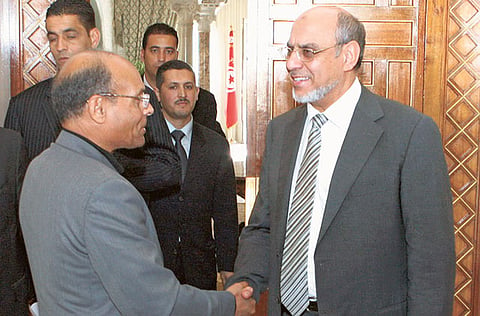Tunisia set for Al Nahda rule
President tasks party chief Jabali with forming new government in 21 days

Manama: Hamadi Jabali, secretary-general of Al Nahda, the moderate Islamist party that won a majority in the post-revolution Tunisian election, was yesterday tasked with forming the new government in three weeks.
"President Munsif Al Marzouqi has charged Hamadi Jabali, the candidate of the party that won the highest number of seats in the national constituent assembly, with forming the government," a statement from the president's office said.
Jabali will have 21 days to present the government to the president, the statement said.
In his first statement after the nomination, Jabali said: "I will seek to form the government as soon as possible so that it can start its work in the service of the people and address problems. The people are waiting for answers and solutions."
Al Nahda has formed a ruling coalition with the liberal Congress for the Republic and the Ettakatol, or Forum Party.
Al Marzouqi, the leader of the Congress for the Republic, was appointed president and Mustafa Bin Jaafar, the leader of Ettakatol was elected Speaker of the constituent assembly.
The new cabinet will take charge after it is approved by the constituent assembly, and until that date, the interim government will continue to run the affairs of the country, according to the statement.
Born in the coastal city of Sousse, one of Tunisia's best-known tourism resorts, on January 12, 1949, Jabali received a bachelor's degree in mechanical engineering from the University of Tunis and Master's in photovoltaic engineering in Paris. He used his expertise in solar energy and wind power to found an enterprise in Sousse.
In 1981, he joined the emerging Movement of the Islamic Tendency and became the managing editor of Al Fajr (The Dawn), the weekly newspaper of Al Nahda.
16-year sentence
In November 1990, he was sentenced by a military court to one year in prison for "defamation of a judicial institution" after the Islamist newspaper published an essay ‘When will military courts, serving as special courts, be abolished?'
In May 1992, the government accused Al Nahda of plotting to kill president Zine Al Abidine Bin Ali and establish an Islamic state. Jabali, together with 170 other Al Nahda members, were charged in August with "attempting to overthrow the regime".
Jabali was sentenced to 16 years in prison for "membership in an illegal organisation" and "attempted change of the nature of the state". He spent 10 years in solitary confinement before he was released in February 2006.
Sign up for the Daily Briefing
Get the latest news and updates straight to your inbox



